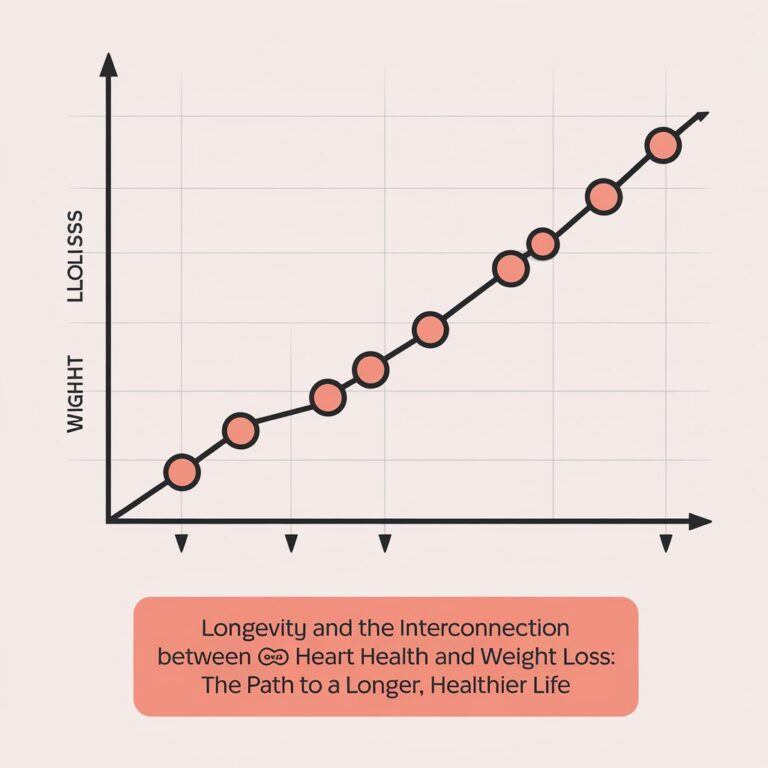Introduction
In today’s fast-paced world, where lifestyle diseases are on the rise, achieving longevity—living a longer, healthier life—has become a paramount concern for people globally. The quest for optimal health is no longer just about extending the number of years we live but improving the quality of those years. Among the key factors that significantly influence longevity are heart health & weight management. Scientific studies have consistently shown that maintaining a healthy heart and achieving sustainable weight loss can significantly increase life expectancy. But more than just adding years to life, they add life to years by preventing chronic diseases, improving mental well-being, and enhancing overall vitality.
In this article, we explore the intricate relationship between heart health and weight loss in the pursuit of longevity, examining the scientific evidence, the psychological components of health behaviors, and modern technologies that support individuals in their journey toward a longer, healthier life. We aim to provide not only scientific insights but also motivational and practical guidance to help readers engage in heart-healthy habits that promote weight loss and longevity.
Understanding Longevity: The Science of Living Longer
Longevity is the result of multiple factors coming together—genetics, environment, lifestyle, and healthcare access. However, while we cannot change our genes, we can influence our environment and lifestyle choices, particularly our diet, physical activity, and mental health. Research from the Blue Zones, areas of the world where people live longer than average, shows that simple, consistent habits play a pivotal role in extending life. These habits often center around natural movement, plant-based diets, strong social connections, and a sense of purpose.
Within this framework, heart health & weight management emerge as key components. Cardiovascular disease remains the leading cause of death worldwide, responsible for nearly 18 million deaths annually according to the World Health Organization (WHO). Additionally, the rise in obesity, which now affects over 650 million adults globally, further exacerbates the risks associated with heart disease. The relationship between these two health metrics—heart health and weight—directly impacts longevity, as both are deeply interconnected with how long and how well we live.
The Link Between Heart Health and Weight Loss: A Bidirectional Relationship
1. Obesity and Heart Disease: A Vicious Cycle
The connection between obesity and cardiovascular disease is well-established in medical literature. Excess weight, especially visceral fat (the fat stored around internal organs), contributes to a variety of risk factors that increase the likelihood of developing heart disease, including:
– Hypertension (High Blood Pressure): Obesity puts extra strain on the heart, increasing blood pressure. Over time, high blood pressure damages the arteries and leads to heart attacks or strokes.
– Dyslipidemia (Abnormal Cholesterol Levels): Excess fat in the body can lead to high levels of LDL (bad cholesterol) and low levels of HDL (good cholesterol), which promotes plaque buildup in the arteries, a key risk factor for heart attacks.
– Insulin Resistance and Type 2 Diabetes: Obesity contributes to insulin resistance, which often progresses to Type 2 diabetes, a significant risk factor for heart disease. The American Heart Association estimates that at least 68% of people aged 65 or older with diabetes die from some form of heart disease.
As such, carrying extra weight places a heavy burden on the cardiovascular system, leading to a shorter lifespan.
2. Weight Loss Improves Heart Function: The Role of Fat Reduction
Losing weight—particularly excess fat—has profound and immediate benefits for heart health. Research shows that even modest weight loss (5-10% of body weight) can lead to substantial improvements in heart health markers. When weight loss occurs, several physiological processes take place:
– Reduction in Blood Pressure: Weight loss decreases the strain on the heart, leading to lower blood pressure levels.
– Improvement in Cholesterol Levels: Losing fat helps reduce LDL cholesterol while boosting HDL cholesterol, reducing the risk of atherosclerosis (plaque buildup in arteries).
– Improved Insulin Sensitivity: Weight loss enhances the body’s ability to use insulin effectively, reducing blood sugar levels and lowering the risk of Type 2 diabetes.
These improvements can dramatically reduce the risk of cardiovascular disease, stroke, and other complications, making weight loss an essential strategy in heart disease prevention and management.
The Psychological Component: Mindset, Motivation, and Behavioral Change
While the physiological benefits of weight loss for heart health are clear, the psychological and behavioral components of achieving and maintaining weight loss are equally important. Many individuals struggle with losing weight not due to a lack of knowledge but because of deeply ingrained behaviors, emotional eating, and environmental challenges.
1. The Role of Motivation in Weight Loss and Heart Health
Motivation is a key driver of health behavior change. However, motivation must go beyond a short-term desire to “look good” or “lose a few pounds.” For weight loss to be sustainable and for heart health to improve over the long term, individuals need to internalize the broader benefits of these changes—living longer, feeling better, and reducing the risk of life-threatening diseases. Studies show that individuals who are intrinsically motivated (i.e., those motivated by the joy of the activity or the knowledge of its health benefits) are more likely to achieve long-term success in weight loss and health improvement.
2. The Psychology of Eating and Behavioral Change
Emotional eating—using food as a way to cope with stress, boredom, or emotional distress—is one of the biggest barriers to weight loss. To break this cycle, it’s important to address the emotional drivers behind unhealthy eating habits. Cognitive-behavioral therapy (CBT) is a proven technique that helps individuals identify and change negative thought patterns and behaviors related to food and weight.
Furthermore, building resilience is crucial. Weight loss, especially when pursued for heart health and longevity, is not a linear process. Setbacks are common, and the ability to recover from them is what ultimately determines success.
3. The Role of Social Support
Human beings are social creatures, and our behaviors are influenced by those around us. Studies show that individuals who engage in weight loss efforts with the support of friends, family, or health professionals are more likely to achieve lasting results. Group support programs , whether in-person or online, provide a sense of accountability and shared purpose that can be highly motivating. Additionally, having a strong support network can help individuals navigate the emotional challenges that often accompany weight loss and lifestyle changes.
The Impact of Modern Technology on Heart Health and Weight Management
Technology has revolutionized the way we approach health and wellness, offering tools that can significantly enhance heart health and support sustainable weight loss. Wearable devices, mobile apps, and digital health platforms allow individuals to monitor their health metrics, track progress, and stay accountable.
1. Wearable Devices: Monitoring Heart Health and Weight Loss
Wearables such as the Apple Watch, Fitbit, and other health trackers provide real-time data on heart rate, physical activity, sleep, and more. These devices encourage users to set daily goals, such as reaching a certain number of steps or maintaining a target heart rate during exercise, which can directly impact both heart health and weight loss. Many wearables also provide insights into heart rate variability (HRV) , a key indicator of cardiovascular fitness and recovery. A higher HRV is associated with better heart health and a greater ability to manage stress.
2. Mobile Apps for Weight Management and Heart Health
Mobile apps like MyFitnessPal, Lose It!, and Noom have become popular tools for managing diet and exercise. These apps allow users to track their food intake, monitor calorie consumption, and set personalized weight loss goals. Many of these apps also integrate with wearables to provide a more comprehensive picture of overall health, including heart health.
3. Telemedicine and Remote Monitoring
Advances in telemedicine have made it easier for individuals to access healthcare services remotely, particularly for those managing chronic conditions such as heart disease or obesity. Remote monitoring devices, such as blood pressure cuffs and ECG monitors , can send real-time data to healthcare providers, enabling timely interventions and more personalized care. This level of monitoring is especially beneficial for high-risk patients who need close management of their heart health while working on weight loss.
4. AI-Powered Nutrition and Fitness Plans
Artificial intelligence (AI) is being used to create highly personalized nutrition and fitness plans based on an individual’s unique health data. AI algorithms analyze factors such as genetics, metabolism, and lifestyle to recommend optimal diets and exercise routines that can help improve heart health and facilitate weight loss. By tailoring recommendations to the individual, AI makes it easier to achieve sustainable results, reducing the risk of heart disease and promoting longevity.
Nutritional Strategies for Longevity: Supporting Heart Health and Weight Loss
Diet plays a critical role in both weight loss and heart health. Adopting a heart-healthy diet not only helps shed excess pounds but also supports long-term cardiovascular health. Several dietary strategies have been shown to improve both heart health and promote weight loss, leading to increased longevity.
1. The Mediterranean Diet
The Mediterranean diet , rich in fruits, vegetables, whole grains, healthy fats (especially olive oil), and lean proteins (such as fish), has been widely studied for its heart health benefits. This diet is associated with a reduced risk of heart disease, stroke, and obesity, and it has been shown to promote weight loss in individuals who follow it consistently.
2. Intermittent Fasting
Intermittent fasting (IF) has gained popularity in recent years for its potential to promote weight loss and improve metabolic health. Studies show that IF can improve insulin sensitivity, reduce inflammation, and promote fat loss, particularly visceral fat, which is closely linked to heart disease.
Intermittent Fasting (continued)
The practice of intermittent fasting (IF) involves cycling between periods of eating and fasting, allowing the body to shift into a state where it more efficiently burns fat for energy. Beyond weight loss, IF is also associated with improving biomarkers of heart health, including:
– Improved Blood Lipids : Intermittent fasting can lower LDL cholesterol and triglyceride levels, both of which are risk factors for cardiovascular disease.
– Reduced Inflammation : Chronic inflammation is linked to heart disease, and studies suggest that intermittent fasting helps reduce inflammatory markers.
– Improved Blood Pressure : Fasting periods may help reduce systolic and diastolic blood pressure, which reduces strain on the heart.
These physiological benefits highlight intermittent fasting’s potential not just for weight management but as a proactive measure for long-term heart health.
3. Plant-Based Diets
Numerous studies have demonstrated the cardiovascular benefits of plant-based diets , which emphasize fruits, vegetables, legumes, nuts, seeds, and whole grains while minimizing animal products. Plant-based diets are naturally low in saturated fat and cholesterol, both of which contribute to heart disease, and they are also high in antioxidants and fiber. Fiber, in particular, plays a crucial role in regulating weight and promoting heart health by:
– Reducing Appetite : High-fiber foods help increase feelings of fullness, reducing overall calorie intake.
– Improving Blood Sugar Control : By slowing digestion, fiber helps prevent blood sugar spikes, which can lead to insulin resistance and weight gain.
– Lowering Cholesterol : Soluble fiber binds to cholesterol in the digestive system, helping remove it from the body and lowering LDL cholesterol levels.
Studies have shown that individuals who follow a plant-based diet tend to have a lower body mass index (BMI) and a reduced risk of heart disease, making this dietary approach ideal for those seeking both weight loss and cardiovascular protection.
4. Portion Control and Caloric Awareness
While the quality of food is essential, the quantity plays a crucial role in weight management and heart health. Overeating, even healthy foods, can lead to weight gain and strain the heart. Practicing portion control and being aware of caloric intake is a simple yet powerful strategy. Caloric awareness doesn’t mean strict dieting; instead, it promotes mindful eating , helping individuals recognize when they are truly hungry versus eating out of habit or emotion.
Exercise and Physical Activity: Building a Stronger Heart and Leaner Body
Regular physical activity is another cornerstone of both heart health and weight management. Exercise strengthens the cardiovascular system, burns calories, and helps maintain a healthy weight—all factors that contribute to longevity.
1. Cardiovascular Exercise
Engaging in aerobic activities such as walking, jogging, cycling, or swimming significantly improves heart function. Cardiovascular exercise increases the heart’s efficiency, enabling it to pump more blood with each beat, which lowers resting heart rate and reduces the heart’s overall workload. The American Heart Association recommends at least 150 minutes of moderate-intensity aerobic exercise per week to promote heart health and assist with weight loss.
Studies show that individuals who incorporate regular cardiovascular exercise into their routines not only improve heart health but also achieve more sustainable weight loss. Importantly, aerobic exercise helps reduce visceral fat , which is the most dangerous type of fat for heart health.
2. Strength Training
While cardiovascular exercise is essential for heart health, strength training is equally important for weight loss and overall longevity. Building muscle helps increase the body’s basal metabolic rate (BMR) , meaning more calories are burned at rest. Additionally, strength training can improve insulin sensitivity , further reducing the risk of diabetes and heart disease.
Strength training exercises such as weightlifting, resistance band exercises, and bodyweight workouts (like squats or push-ups) are crucial for developing lean muscle mass, which helps individuals maintain a healthy weight and support heart health. Combined with aerobic exercise, strength training creates a balanced fitness routine that enhances longevity.
3. The Role of Physical Activity in Mental Health
Physical activity also has profound effects on mental well-being , which is closely linked to longevity. Exercise releases endorphins (often called “feel-good” hormones), which reduce stress, anxiety, and depression—conditions that are often associated with overeating and poor heart health. Moreover, regular physical activity helps regulate sleep patterns, and quality sleep is essential for both heart health and weight management.
By improving both physical and mental health, regular exercise creates a positive feedback loop , making it easier to maintain heart-healthy habits and a healthy weight, which in turn increases longevity.
The Impact of Stress on Heart Health and Weight Loss
Chronic stress has detrimental effects on both heart health and weight management, and managing stress effectively is a crucial component of any longevity strategy. When the body is under stress, it releases cortisol , a hormone that helps the body respond to perceived threats. However, prolonged elevated cortisol levels contribute to weight gain, particularly around the abdomen, and increase the risk of heart disease.
1. Stress and Emotional Eating
Many individuals turn to food as a coping mechanism for stress, which often leads to emotional eating and weight gain. Foods that are high in sugar and fat temporarily boost mood by increasing dopamine, a neurotransmitter associated with pleasure, but this can create a cycle of unhealthy eating that ultimately harms heart health.
By addressing the root causes of emotional eating—whether through therapy, mindfulness practices, or stress-reduction techniques—individuals can break this cycle and make healthier food choices that support both weight loss and cardiovascular health.
2. Stress Management Techniques
Implementing stress management techniques is essential for both heart health and weight loss. Effective stress management reduces cortisol levels, improves sleep, and prevents overeating. Techniques such as mindfulness meditation , deep breathing exercises , yoga , and progressive muscle relaxation have been shown to lower blood pressure, improve mood, and support healthier eating patterns.
Incorporating these practices into daily life helps create a sense of calm and focus, which in turn makes it easier to engage in heart-healthy and weight-conscious behaviors.
Psychological Resilience and Longevity: The Mind-Body Connection
In addition to physical health, psychological resilience plays a significant role in determining longevity. Individuals who develop resilience—the ability to bounce back from adversity—tend to make healthier choices, cope better with stress, and maintain a positive outlook, all of which contribute to longer life expectancy.
1. The Power of a Growth Mindset
Having a growth mindset —the belief that abilities can be developed through dedication and hard work—has been shown to improve health outcomes, including weight loss and heart health. Individuals with a growth mindset are more likely to stick to healthy habits, even when they encounter setbacks, because they view challenges as opportunities to learn and grow.
By fostering a growth mindset, individuals can shift their focus from short-term results (like losing a few pounds) to long-term health benefits (like preventing heart disease and living a longer, healthier life).
2. The Importance of Purpose and Social Connection
A sense of purpose and strong social connections are also linked to greater longevity. Studies show that individuals who feel they have a purpose in life tend to engage in healthier behaviors and are more motivated to take care of their heart and body. Similarly, those with strong social networks—friends, family, or community groups—are more likely to follow heart-healthy lifestyles and achieve lasting weight loss.
Both purpose and connection provide psychological support that helps individuals stay resilient in the face of challenges, contributing to a longer, healthier life.
Achieving longevity through heart health and weight loss is not just about diet and exercise—it requires a holistic approach that integrates physical, mental, and emotional well-being. To live longer and healthier, individuals must adopt practices that support both the body and mind.
1. Mindful Eating and Intu













